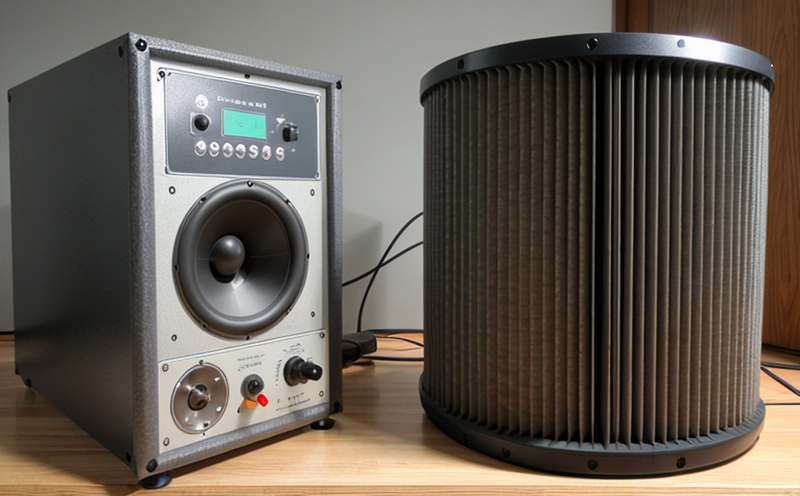ISO 717-1 Airborne Sound Insulation Testing in Ship Cabins
The ISO 717 series of standards, particularly ISO 717-1, specifies the methods for measuring airborne sound insulation in buildings and ships. For marine and ship equipment testing, this standard is crucial to ensure that cabins meet the required noise insulation performance levels. This service ensures compliance with international safety and quality standards, providing a critical role in enhancing passenger comfort and crew well-being.
The process involves measuring the amount of airborne sound that passes through walls, partitions, or doors separating different spaces within a ship. This is particularly important for maintaining privacy and reducing noise pollution in shared living areas like crew quarters and passenger cabins. The standard is designed to provide objective data on the performance of the materials used in these structures.
The testing procedure typically involves placing test specimens between two rooms, one containing a sound source (such as speakers) and the other equipped with microphones to measure the sound transmitted through the specimen. The sound source emits continuous pink noise over a frequency range from 100 Hz to 3150 Hz. The level of sound in both rooms is then measured at specific frequencies using octave bands, and the difference between these levels provides an indication of the sound insulation performance.
The standard also specifies criteria for acceptable performance based on the type of space being tested (e.g., crew quarters, passenger cabins). For example, certain maximum noise levels are stipulated to ensure that the environment remains comfortable. The testing process is rigorous and involves multiple trials to account for variability in environmental factors like temperature and humidity.
The importance of this testing cannot be overstated. Noise pollution in ships can lead to reduced crew efficiency, increased stress levels among passengers, and even health issues over time. By ensuring compliance with ISO 717-1 standards, we contribute significantly to the overall well-being of those on board.
Our laboratory utilizes advanced equipment and methodologies to conduct these tests accurately and efficiently. Our team of experts ensures that all steps are meticulously followed, from specimen preparation to data analysis. We provide comprehensive reports detailing our findings, which can be used by clients for regulatory compliance or internal quality assurance purposes.
The results of this testing are critical inputs in the design and construction phases of ships. Designers and engineers rely on these test outcomes to refine their plans, ensuring that new builds meet not only safety regulations but also comfort standards. This service plays a pivotal role in the continuous improvement of marine environments, contributing to safer and more comfortable living conditions for all involved.
Moreover, compliance with ISO 717-1 is increasingly becoming a competitive advantage for shipbuilders. As consumers become more aware of the importance of noise control in living spaces, manufacturers who meet these standards are likely to attract a larger customer base. By offering this service, we help our clients stay ahead of market trends and regulatory requirements.
Applied Standards
| Standard Number | Description |
|---|---|
| ISO 717-1 | Methods of measurement for airborne sound insulation in buildings and ships |
| ASTM E90 | Standard test methods for determining the sound insulation of building partitions |
| EN ISO 714 | Determination of sound insulation between rooms in multi-family dwellings |
The application of these standards ensures that our testing is consistent with international best practices. Our laboratory adheres strictly to the methodologies outlined by these organizations, ensuring reliable and reproducible results.
Industry Applications
| Application | Description |
|---|---|
| Crew Quarters | Evaluating the effectiveness of partitions in reducing noise pollution and enhancing privacy. |
| Passenger Cabins | Determining sound insulation levels to ensure comfort and reduce stress among passengers. |
| Engine Rooms | Assessing the impact of engine noise on surrounding areas, ensuring compliance with environmental regulations. |
The data generated from these tests is invaluable for various stakeholders in the marine industry. For instance, shipyard managers can use this information to optimize material choices and construction techniques. Engineers can incorporate this knowledge into their designs, leading to more efficient and comfortable vessels. Regulatory bodies benefit by having concrete evidence of compliance with international standards.
International Acceptance and Recognition
The ISO 717-1 standard is widely recognized and accepted in the marine industry for its comprehensive approach to airborne sound insulation testing. This recognition extends beyond national borders, making it a globally applicable benchmark.
Countries with established maritime industries often integrate these standards into their own regulations. For example, countries like Norway and Japan have adopted ISO 717-1 as part of their mandatory compliance requirements for new ship construction. By ensuring that our testing aligns with this standard, we help clients meet the expectations of international markets.
Furthermore, certification bodies around the world accept results from labs that comply with these standards. This acceptance ensures that manufacturers can confidently present their products to global customers without concerns about differing local requirements. The widespread adoption of ISO 717-1 reflects its relevance and reliability in addressing critical issues within the marine environment.





